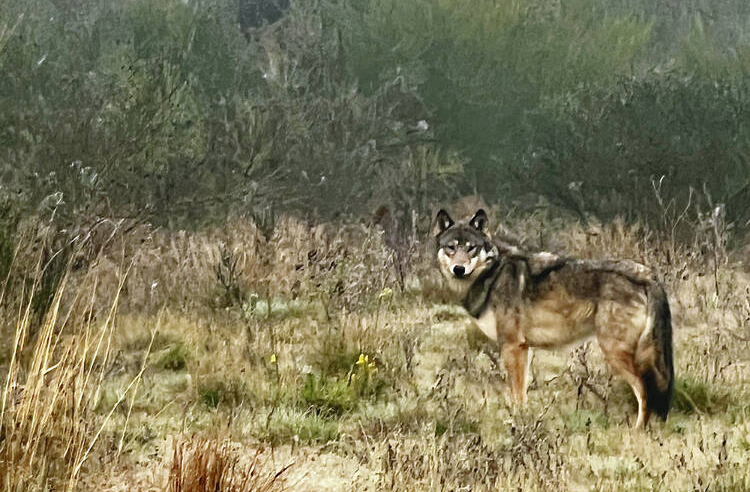A group trying to capture a wolf-dog hybrid near Coombs believes there may be a second similar animal in the area.
There have been sightings of a wolf-dog with a coat darker than the one that was spotted on a wolf-dog in early fall in the area west of Parksville, Gary Slade, spokesman for Find Lost and Escaped Dogs Vancouver Island (FLED), said Thursday.
“The original wolf-dog is kind of a lighter colour.”
The animal has been nicknamed WD-40 because of his ability to evade large cage traps set out for him.
He will walk up to a large cage trap but not touch food left out as bait, said Slade, who initially attempted to trap the animal that way.
Locals believe the wolf-dog, estimated to weigh about 54 kilograms, was dumped out of a truck and abandoned.
Slade asks anyone who spots a wolf-dog to take a photo on their phone.
Feelings have been running high in the rural area, where some people are nervous of walking their pets through the woods. Someone on social media threatened to shoot the dog with a crossbow, Slade said.
At least two domestic dogs have been injured in faceoffs with the wolf-dog. One family was left with a $10,000 vet bill.
In another case in November, a wolf-dog attacked a small French bulldog that was being walked on a leash, broke its collar and escaped with its prey. The family searched for the pet, called Ocean, but only found a trail of blood.
Slade said the bold attack was not typical behaviour for WD-40, who is known to follow people in the woods and whine, but will not approach people or allow them to come close.
That’s another reason he suspects a second wolf-dog may be in the area.
Reports of what might be a second wolf-dog started coming in late last year, he said.
A local woman is trying to entice WD-40 with food in hopes of eventually being able to trap the animal and transfer him to a wolf-dog sanctuary in Cochrane, Alberta, which Slade said has agreed to take the animal. A spokesperson for that facility could not be reached Thursday.
The woman, who does not want to be identified, visits daily to feed the wolf-dog good-quality food paid for by FLED, Slade said.
The woman puts out the food and sits down while the animal eats. Sometimes the animal will lie down nearby, but won’t let her touch him, he said.
Slade said that FLED can’t use a tranquilizer dart on the wolf-dog, since a veterinarian is needed to determine the correct dose.
The B.C. Conservation Officer Service’s mandate doesn’t cover dog breeds or hybrids, although officers have offered advice and support and have loaned equipment — including a large cage — to the Coastal Animal Control Services of B.C.
Conservation officers have also helped connect CAC to additional resources, such as the B.C. Trappers Association, a provincial spokesman said in a statement.
“We understand the concern and frustration people have expressed about this animal,”
Coastal Animal Control is the lead agency responsible for catching the wolf-dog.
A spokesperson for Coastal Animal Control Services, which is contracted by the Regional District of Nanaimo, could not be reached on Thursday.
Parksville-Qualicum MLA Adam Walker said he was not aware of differing reports about the wolf-dog’s appearance. “It seems unlikely that there would be a second one.”
Until the wolf-dog is captured, Walker urged residents to be vigilant and keep their dogs on leashes in the area.



